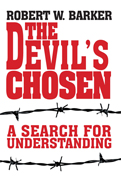"Not a bad man, Jurek thought. Better than most. The man would not survive the camps. He would be shot for holding back when he was told to whip a boy of fourteen years."

 |
The Devil's Chosen:
A Search for Understanding by Robert W. Barker iUniverse
book review by John E. Roper
A plethora of books have chronicled the Holocaust. Writers such as Elie Wiesel, Primo Levi, and Corrie Ten Boom have penned horrifying firsthand accounts of their own experiences as inmates in the death camps. Others have given broad overviews of the topic, offering up scholarly examinations as to the social and political reasons behind Hitler's Final Solution for the Jews and other peoples the Nazis viewed as detriments to society. Some authors have even turned to fiction to tell the story of what was one of the most brutal and far-reaching systematic massacres in recorded history. Barker's book falls into this latter category, and yet due to the amount of personal interviews he has conducted with witnesses to the atrocities of the time period, as well as the additional research into the subject he has delved into, his tale has more of a feeling of truth to it than the average World War II novel.
Using an emotionally conflicted former SS officer named Hans Gruber and his memories as a narrative thread to link a series of scenes from the war together, Barker presents the passions, fears, and hardships of ordinary people caught up in the maelstrom of racial hatred. As Hans travels to or discusses various hotspots of the war, Barker weaves in stories of individuals within those locales who are also affected by the chaos around them. Jurek Toporek, for example, is a Polish Jew who struggles to find a way to save his family from the rapidly developing dangers on the horizon. However, no matter where he travels the cancer of racism and the ever-growing Nazi war machine travels, too. After a series of thwarted attempts to escape what is coming, including an encounter with members of the British Expeditionary Force at Dunkirk, Jurek ends up spending the latter part of the war trying to survive the depravities of life in a concentration camp. In the end, he makes it out alive, but the family he had hoped so desperately to save doesn't. Their story ends behind the walls of the Warsaw Ghetto.
One of the greatest strengths of Barker's writing is his ability to make his characters believable and multifaceted. While victims of the war such as Jurek, teenager Mayer Baeck, or the Jews of Babi Yar are easy for the reader to relate to and feel sympathy for, the author's treatment of those committing crimes against humanity is not stereotypical as is too often seen in stories of the Holocaust. In the character of Hans, Barker crafts a man obviously highly affected by the drama of his past. As he interacts with his interviewer he often rationalizes the behavior of his fellow countrymen and himself by citing the thinking of the times which was caused by the social and political pressures placed on them by the rest of the world and the teachings of the churches in Germany. He criticizes other nations, as well, including America for its own history of racism. Yet despite how strongly he makes his case in defense of his actions, as the book progresses the self-loathing begins to emerge, and we see not a monster but simply an ordinary man who was too frightened to challenge the evil around him.
Both thought-provoking and troubling, The Devil's Chosen raises several questions about human frailty and courage. A winner of the Eric Hoffer Award, it is an excellent book that challenges its readers to take a closer look at the Holocaust and its victims on both sides of the war.
RECOMMENDED by the US Review